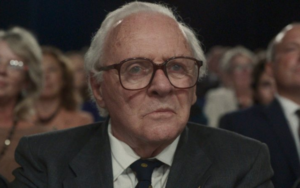ONE LIFE: 3 STARS. “given life by the emotional story and performances.”
 Chances are good you have seen the extraordinary viral video of elderly London stockbroker Nicolas Winton, given a standing ovation by the grown survivors of the 669 children, mostly Jewish, he rescued from Czechoslovakia before the Nazi occupation closed the borders. Taken from the BBC television show “That’s Life,” it is moving footage that has been viewed millions of times.
Chances are good you have seen the extraordinary viral video of elderly London stockbroker Nicolas Winton, given a standing ovation by the grown survivors of the 669 children, mostly Jewish, he rescued from Czechoslovakia before the Nazi occupation closed the borders. Taken from the BBC television show “That’s Life,” it is moving footage that has been viewed millions of times.
“One Life,” a new biopic starring Anthony Hopkins, Johnny Flynn, Jonathan Pryce and Helena Bonham Carter, and now playing in theatres, provides the background of the much-viewed video and the man known as the “British Schindler.”
Based on the book “If It’s Not Impossible…: The Life of Sir Nicholas Winton” by Barbara Winton, the film toggles back-and-forth between 1987 London and 1938 Czechoslovakia. In the contemporary scenes Winton (Hopkins) is in retirement, puttering around a house stuffed with memories, paperwork and artefacts from his past. He continues his charitable work, still haunted that he was not able to save more children, while his wife Grete (Lena Olin) urges him to clear out the ephemera of the past and slow down. “Why would I want to slow down?” he asks.
Played by Flynn in the flashbacks, Winton is on assignment for the British Committee for Refugees From Czechoslovakia. In Prague, taken by the plight of the stranded children he encounters, the hunger and the mortal danger the impending Nazi occupation, he puts into motion the massive relocation of hundreds of children. Through money raising efforts, arranging visas and foster care, he spirits nine trainloads of children, through precarious circumstances, to safety in Britain.
The famous viral video, in which Winton is finally able to see, and maybe for the first time, understand, the results of his work, is recreated to great emotional effect. But even as his status as a national hero grows, he grumbles, “This is not about me.”
As the latter-day Winton, Hopkins gives a quietly powerful performance. It is empathetic work colored by the guilt Winton carried. “I’ve learned to keep my imagination in check,” he says, referring to the children left behind, “so I don’t go raving mad.” In a restrained movie, it is his inner work that bursts forth, making us feel the immense impact of Winton’s work.
“One Life” is a potent story of doing the right thing, trapped in a staid historical biopic, but given life by the emotional story and performances.
